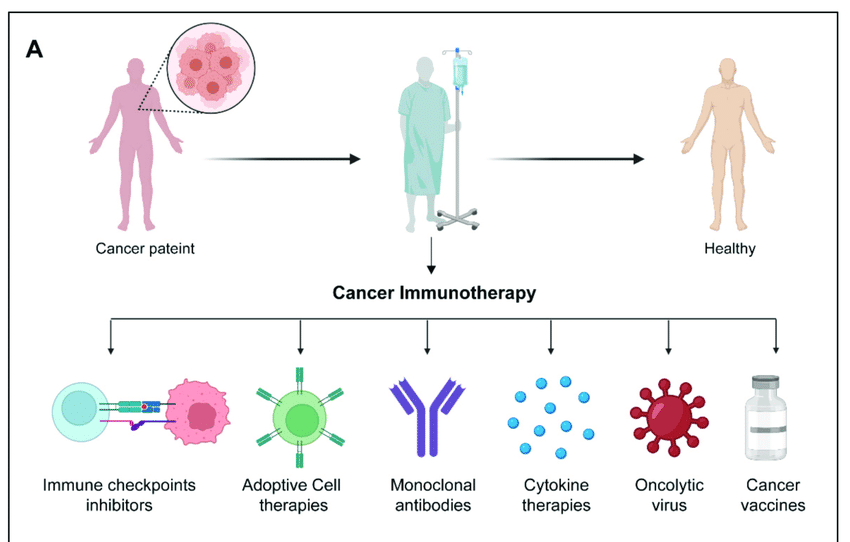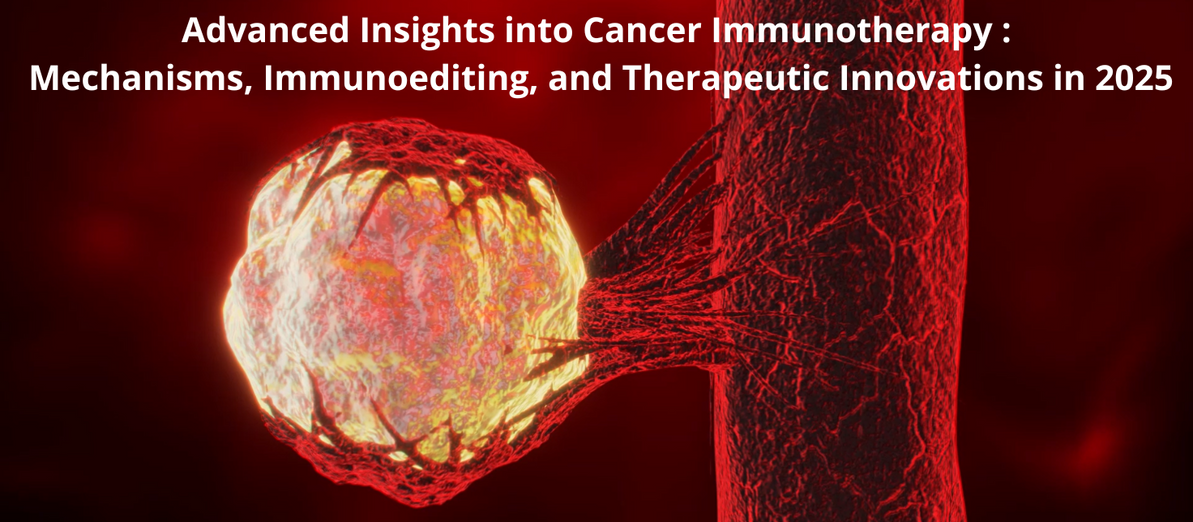Advanced Insights into Cancer Immunotherapy: Mechanisms, Immunoediting, and Therapeutic Innovations in 2025
Cancer continues to pose one of the greatest challenges in modern medicine, but the rapid evolution of cancer immunotherapy is revolutionizing treatment approaches as we enter 2025. This cutting-edge field harnesses the body’s immune system to effectively target and eliminate malignant cells, offering new hope for patients, caregivers, and researchers alike.
- Technical Overview of Cancer Immunotherapy Modalities
Cancer immunotherapy encompasses a spectrum of precision-based strategies designed to enhance antitumor immunity. Below, we delineate the primary modalities driving clinical and translational progress in 2025:

1. Immune Checkpoint Inhibitors for Cancer: Molecular Mechanisms and Clinical Efficacy
Immune checkpoint inhibitors, including PD-1 and PD-L1 inhibitors, modulate T-cell inhibitory pathways by blocking interactions such as PD-1/PD-L1 and CTLA-4/B7. These agents restore the cytotoxic capacity of CD8 T cells and NK cells, facilitating tumor elimination through enhanced immune surveillance and tumor suppression. Recent phase III clinical trials demonstrate their efficacy in cancers with high tumor mutational burden, achieving sustained responses in advanced metastatic tumors, though resistance mechanisms like tumor antigen loss remain a challenge.
2. Adoptive Cell Therapy for Cancer: Genetic Engineering and Therapeutic Outcomes
Adoptive cell therapies, such as CAR T-cell and TIL therapies, involve the ex vivo expansion and genetic modification of autologous immune cells, including CD4 T cells, CD8 T cells, and NK cells, to target tumor-specific antigens. Success rates are particularly notable in hematologic malignancies and select solid tumors, with ongoing optimization addressing barriers like cytokine release syndrome and cancer immune escape. Clinical data from 2025 trials underscore their potential in overcoming immunosuppressive tumor cells, though scalability and cost remain considerations.
3. Monoclonal Antibodies in Cancer Treatment: Targeted Immunomodulation and Synergy
Monoclonal antibodies targeting checkpoints (e.g., CTLA-4) or tumor-associated antigens provide targeted immunomodulation, enhancing immune recognition of less immunogenic tumor cells. Their integration with checkpoint inhibitors amplifies antitumor responses, as evidenced by improved progression-free survival in phase II studies. These biologics mitigate immune escape mechanisms, supporting tumor suppression while minimizing off-target effects on normal cells, a critical consideration in precision oncology.
4. Cytokine Therapy for Cancer: Immunostimulatory Mechanisms and Optimization
Cytokine therapies, leveraging agents such as IL-12, IL-2, and IFN-γ, stimulate innate and adaptive immune responses to target highly immunogenic tumor cells. While effective, cytokine therapy for cancer induces significant immune-related adverse events, including systemic inflammation, necessitating dose optimization and combination with checkpoint inhibitors. Recent studies in 2025 focus on engineered cytokines to enhance specificity and reduce side effects, improving therapeutic efficacy in tumor equilibrium phases.
5. Oncolytic Virus Therapy for Cancer: Immunogenic Cell Death and Clinical Translation
Oncolytic viruses, genetically modified to selectively lyse tumor cells, induce immunogenic cell death, triggering adaptive immune responses against residual cancer cells. Their effectiveness in reversing cancer immune escape is demonstrated in combination with PD-1 inhibitors, targeting immunosuppressive tumor cells and promoting tumor progression inhibition. Phase I/II trials in 2025 highlight their potential in solid tumors, with ongoing research optimizing viral vectors for enhanced specificity.
6. Cancer Vaccines Development and Clinical Trials: Neoantigen Targeting and Immune Priming
Cancer vaccines, including neoantigen-based and dendritic cell vaccines, prime the immune system to recognize tumor-specific antigens, countering antigen loss and immune escape. Current cancer vaccines development in 2025 focuses on personalized mRNA platforms and adjuvant strategies, with clinical trials demonstrating efficacy in preventing tumor recurrence and addressing advanced metastatic tumors. These vaccines enhance immune surveillance, offering a prophylactic and therapeutic approach to tumor suppression.
- Immunoediting Dynamics: A Triphasic Model of Tumor-Immune Interaction
The immunoediting process, comprising elimination, equilibrium, and escape phases, elucidates the evolutionary dynamics between tumors and the immune system, informing immunotherapy design:

1. Elimination Phase: Immune Surveillance and Tumor Suppression
In the elimination phase, NK cells, CD8 T cells, and CD4 T cells detect and eradicate highly immunogenic tumor cells via recognition of tumor antigens and cell stress ligands. This phase, underpinned by robust immune surveillance, exemplifies the innate and adaptive immune system’s capacity for tumor suppression, a target for early-stage cancer immunotherapy interventions.
2. Equilibrium Phase: Genetic Instability, Immune Selection, and Tumor Dormancy
The equilibrium phase is characterized by genetic instability and immune selection, where less immunogenic tumor cells persist in a dormant state, evading complete eradication. Myeloid-derived suppressor cells (MDSCs) and regulatory T cells (Tregs) contribute to tumor dormancy, necessitating advanced therapies like cytokine therapy and monoclonal antibodies to disrupt this balance and promote tumor elimination.
3. Escape Phase: Antigen Loss, Immune Escape, and Tumor Progression
In the escape phase, immunosuppressive tumor cells upregulate PD-1/PD-L1, IL-10, and TGF-β, driving antigen loss and cancer immune escape. This facilitates tumor progression, rendering tumors resistant to immune attack. Strategies such as CTLA-4 blockade and oncolytic virus therapy are critical to reversing immune escape, reinstating antitumor immunity, and addressing tumor antigen loss in 2025.
- Challenges and Future Directions: Precision Oncology in 2025
Despite progress, cancer immunotherapy faces challenges, including tumor antigen loss, the prevalence of immunosuppressive tumor cells, and cancer immune escape mechanisms. The latest advances in cancer immunotherapy in 2025 prioritize biomarker-driven combination therapies, integrating checkpoint inhibitors with adoptive cell therapies and oncolytic viruses. Computational immunology and multi-omics approaches further identify novel targets, enhancing the effectiveness of oncolytic virus therapy and cancer vaccines for advanced metastatic tumors.
Recent Posts
-
Nicholas E. Navin’s Keynote on Breast Cancer at SCSOmics 2025 (with Lieven in Attendance)
At SCSOmics 2025, held earlier this year, Nicholas E. Navin, PhD, delivered a keynote address that d …17th Sep 2025 -
Reflections on Our Experience at the Vatican Longevity Summit
On March 24, 2025, the Vatican opened its doors to a remarkable gathering of scientists, ethicists, …25th Mar 2025 -
Gentaur : The Leading Distributor of Applied Biological Materials (ABM) in Belgium and Europe
Driving Scientific Innovation with ABM's Cutting-Edge Products Gentaur has long been the trusted dis …19th Mar 2025




